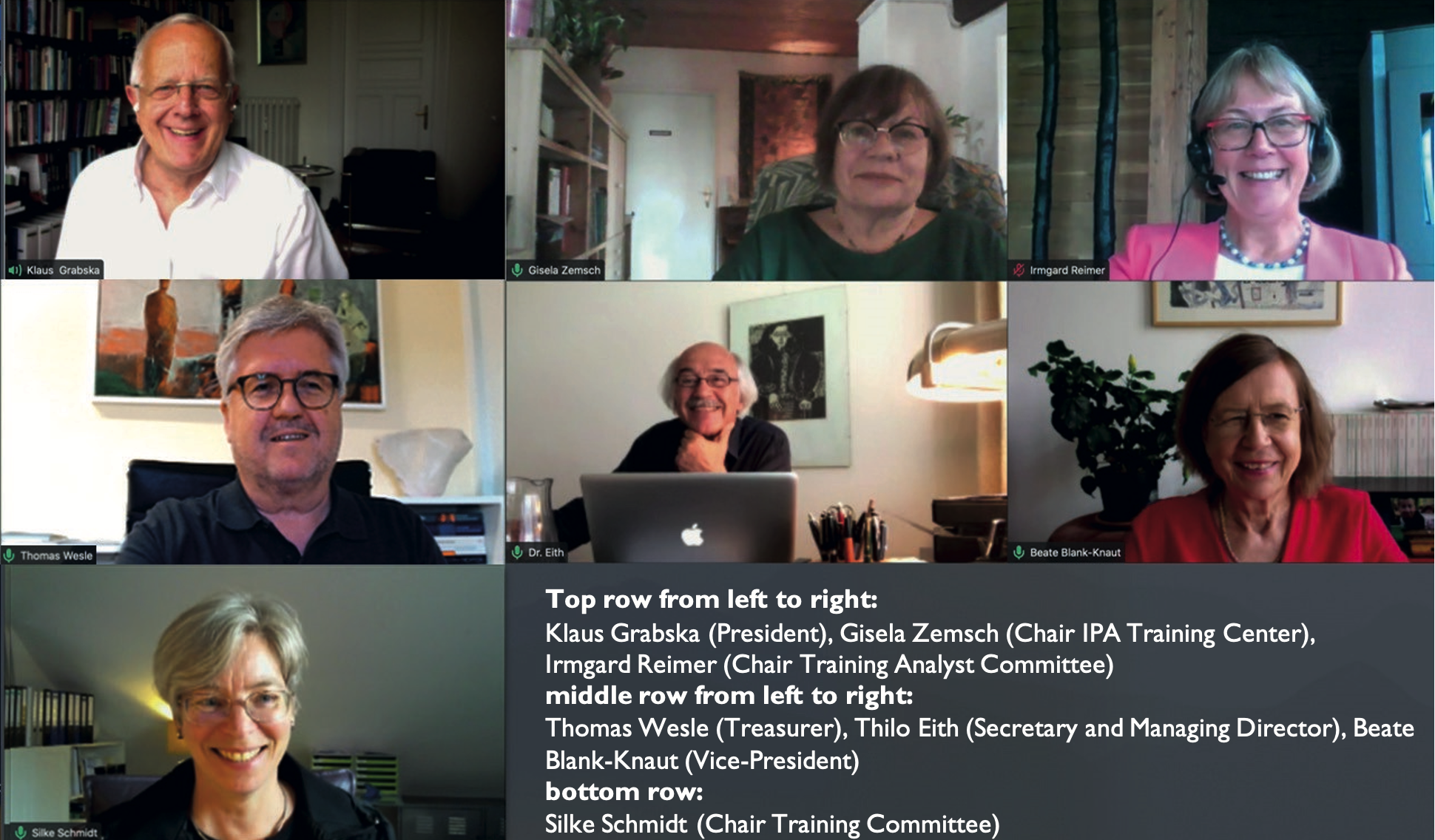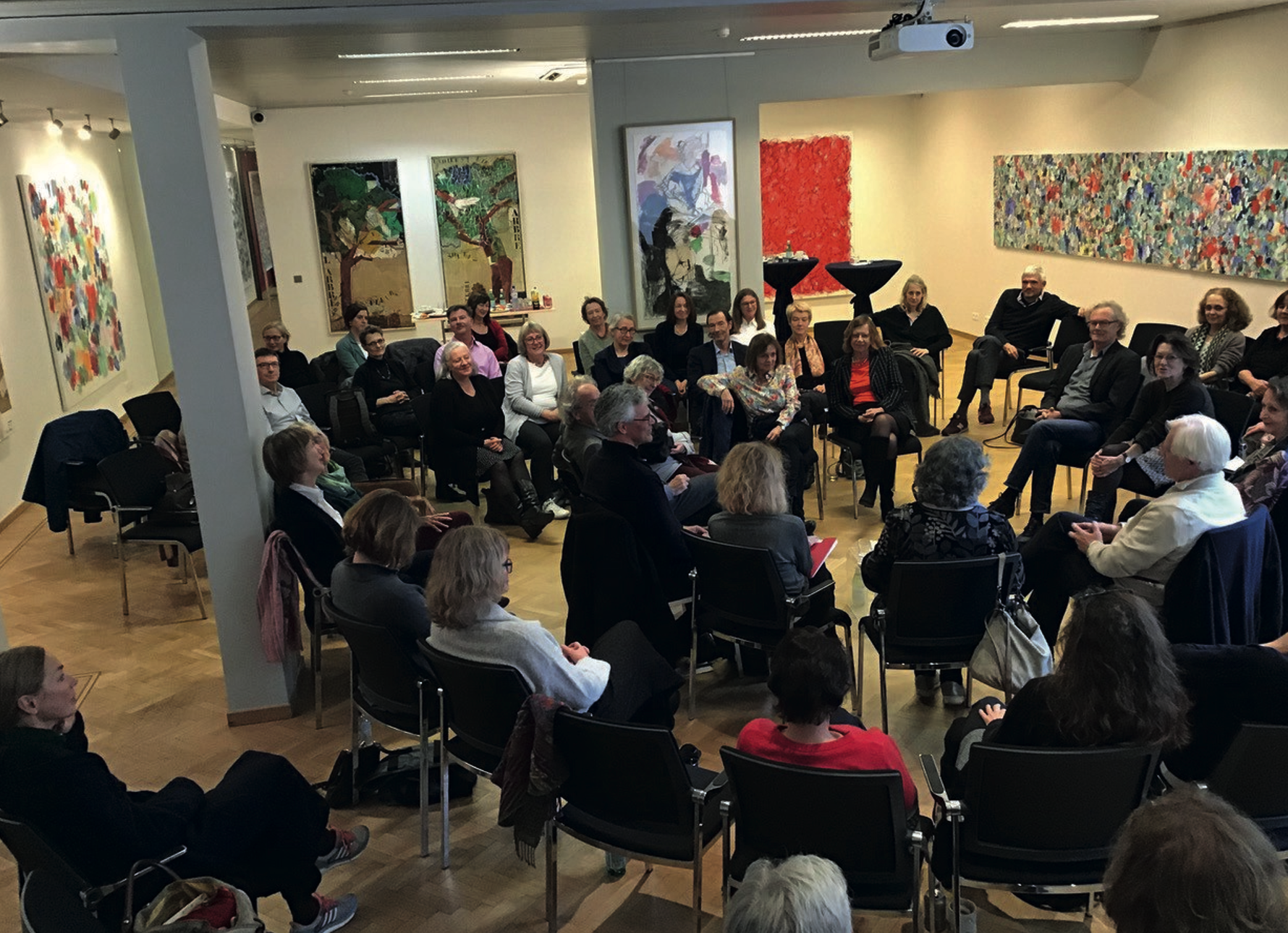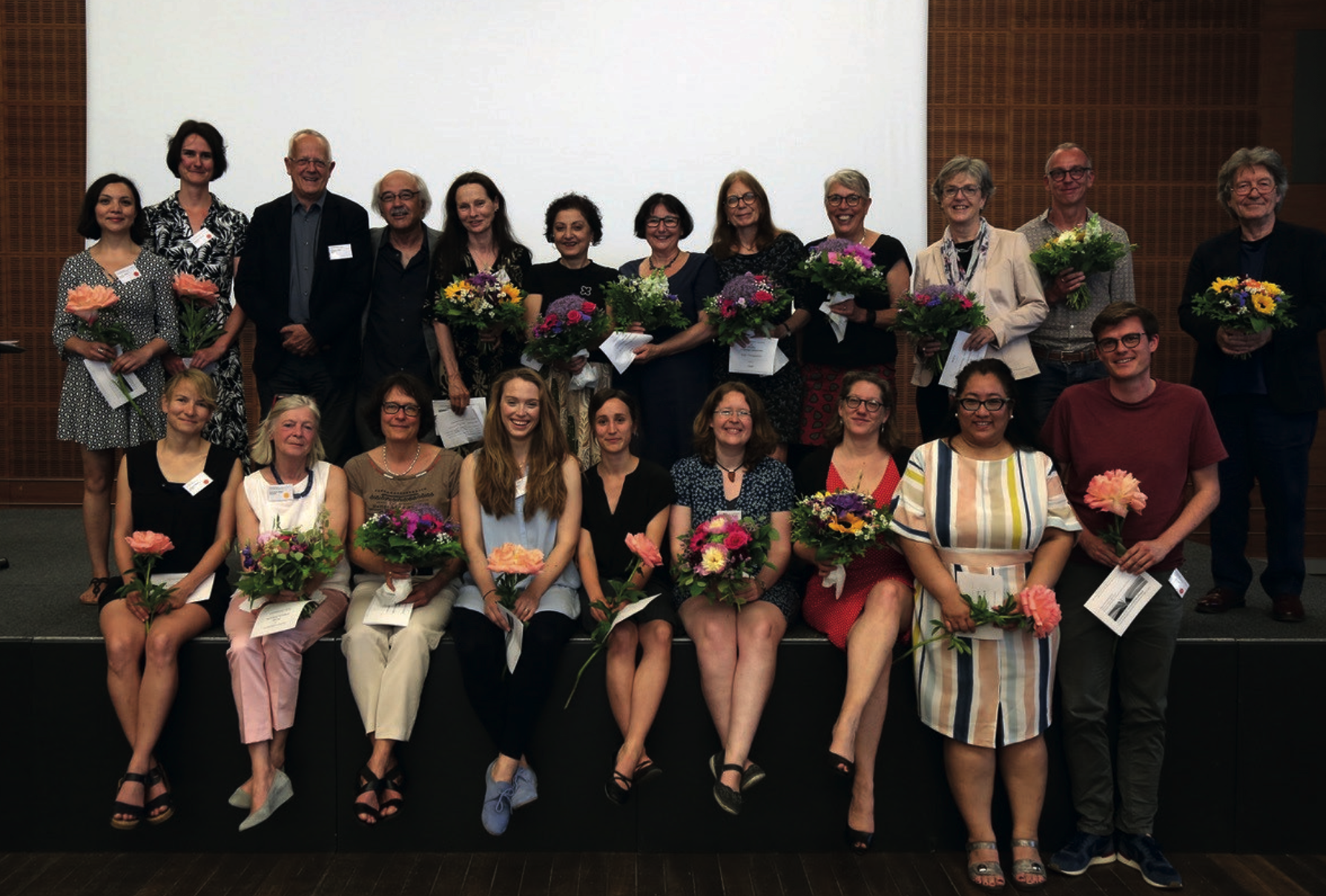
German Psychoanalytical Society
www.dpg-psa.de
Who we are
The German Psychoanalytical Society (Deutsche Psychoanalytische Gesellschaft/DPG) is one of the two IPA component societies in Germany and also a member of the European Federation of Psychoanalytic Societies (EFP). For many years now, we cooperate well with the DPV (German Psychoanalytical Association) in trusting and good relations on political, scientific and personal levels.
DPG members work in different professional areas, mostly however in private practice, thus providing psychoanalytic and psychotherapeutic treatment within the German health services for vast numbers of patients, thereby also expanding the scope of psychoanalysis in out- and inpatient-clinics and psychosocial institutions. Furthermore, there is a small but significant group involved in academia, conducting research and ensuring higher education.
There are twenty regional groups of the DPG spread all over Germany, which regularly hold scientific meetings, discuss psychoanalytical issues, thus ensuring an animated psychoanalytical discourse embracing their membership.
The psychoanalytical training - based on the Eitingon model - is organised by fifteen DPG-Institutes following our society's training guidelines. Several of them also have a branch for training in psychodynamic psychotherapy.

Where do we come from
Today's Deutsche Psychoanalytische Gesellschaft (DPG) holds the same name as the original German Psychoanalytical Society, which originated from the Berlin Psychoanalytical Association founded in 1908 by Karl Abraham. However there has not been continuity, but rather a catastrophic break in our history. The Nazi period and the terrible persecution of our Jewish colleagues within the genocide of Jewish people led to a fundamental collapse of psychoanalysis in Germany.
Even though those psychoanalysts who founded the DPG after the second world war (WWII), had a different perspective on this topic. It is nowadays obvious that these colleagues were still way too much involved in the Nazi era and identified with the fundamental distortions of psychoanalytic thinking of that time. It took years and the work of generations of analysts to alleviate the burden of our Nazi legacy in order to be able to work through shame and guilt, to get in touch with the international psychoanalysis in a new way and to reclaim psychoanalysis proper as common ground for DPG members.
In 1949 the readmission of the DPG to the IPA was refused. The DPV then separated from the DPG in 1950 and was admitted to the IPA already in 1951. Not until the late 1980s a rapprochement between the DPG and the DPV was possible - supported by several group conferences based on the Tavistock model, in which Israeli and German colleagues from both German societies took part. This was of crucial importance for the historical working through of the participation of psychoanalysts during the Nazi period and for the overcoming of the subsequent splitting of psychoanalysis in Germany during the post-Nazi era. Nowadays both psychoanalytic societies - DPG and DPV - share responsibility for the history and development of psychoanalysis in Germany and are committed to its future in close cooperation with each other.
The process described led to efforts to rejoin the IPA and to a reorganization of the DPG's psychoanalytic training following international standards. This was accompanied by an intensive professional debate and development within the DPG membership, supported with great commitment by Annemarie Sandler, who, together with many colleagues of the IPA, worked individually and in groups toward an in depth understanding of international psychoanalysis. We are extremely grateful to Anne-Marie Sandler, Inga Villareal, Andre Haynal, John Kafka, and Sverre Varvin as international members of the former Joint Steering Committee, which accompanied and oversaw the development of the DPG on the part of the IPA.
Even though there can be no "healing" of history through this process of rapprochement, the DPG has gained again access to the international discourse and the psychoanalytic community which has great value for us. At the IPA Congress in Nice in 2001 the DPG was recognised within the framework of a special agreement as "Provisional Society of the IPA Executive Council" and in Chicago in 2009 as a component society of the IPA.
On the one hand the DPG has been able to avoid an institutional split on its way into the IPA. On the other hand, since 2001 the DPG consists of a group of IPA members and a group of non-IPA members. The DPG is therefore constantly faced with the task of balancing internal tensions arising between these two types of membership in a good enough manner and consistent with the requirements of an IPA component society. Integration for the DPG in this case is not something that has been achieved once, but rather an ongoing process in which the most active members are wholeheartedly involved.
What our activities are
The primary tasks of the DPG are to train psychoanalysts, to promote psychoanalysis as a science and as a special way of thinking with the unconscious and to facilitate the psychoanalytic qualifications of our members.
Following this, we organize an annual scientific and social meeting for our members and guests in different regions of Germany. The main papers held on the congress, are published in a congress booklet, available for all members and interested colleagues outside DPG.
Psychoanalytic training in the DPG follows a two-track model. All candidates complete a training leading to DPG membership. Candidates who also want to become IPA members must apply for the IPA training and have interviews with two IPA training analysts. In case of admission for the IPA training track, they become candidates of the IPA Training Centre which organizes, regulates and examines the IPA training in the DPG in its own responsibility, partly embedded in the structure of the DPG training, which is conducted regionally at the 15 DPG institutes.
The main differences between these two tracks are
- the frequency of training analysis and supervised treatment cases (four times a week versus three times a week),
- the fact that the training course in the IPA track is bound to IPA training analysts and
- the requirement that our candidates, to become IPA member, must pass two examinations, one at their institute for DPG membership and only then one at the IPA Training Centre for IPA membership.
In accordance with this, our members must also pass two evaluations to become IPA Training Analysts - first one as DPG Training Analyst, only then one as IPA Training Analyst. Due to the challenging requirement of a double evaluation, primarily the particularly motivated colleagues are interested as candidates in IPA training and also as members in becoming IPA training analysts.

Annual DPG case conference at the House of the European Psychoanalytical Federation in Brussels with
Eva Schmidt-Gloor and Serge Frisch (formerly Anne-Marie Sandler Case Conference)
In addition to the annual conferences, the DPG promotes continuing psychoanalytic qualifications for the membership within the framework of six work groups - working continuously over many years on specific topics, such as: migration, ethical questions, psychoanalysis in society-at-large, psychoanalysis and religion, analytic treatment of psychoses and psychoanalytic case conferences.
In particular, the working group on psychoanalytic case conferences had and has a special significance for the development of analytical competence within the DPG. Many years of exceptionally enriching case conferences with Anne-Marie Sandler, Rosine Perelberg, Betty Joseph, Irma Brenman Pick, Edna O'Shaughnessy, Eva Schmid-Gloor, Donald Campbell, Serge Frisch, Michael Parsons, Richard Rusbridger and others in Germany, London or Brussels had a profound influence on the psychoanalytic work of many of our members and shaped their understanding of what psychoanalysis is all about.
Of further particular relevance, especially for the exchange of peers beyond the scope of one's own society, are the annual joint case conferences with the DPV since 2002, and the biennial conferences with a strong focus on case material of the British-German Colloquium, organised by the two British and the two German IPA societies, most recently in Potsdam in 2019 on the topic of "Language in the Talking Cure - Connecting and Dividing".
In this context, the biennial German-speaking International Psychoanalytical Conference (DIPSAT), held jointly every two years by the Swiss Society, the two German and the two Austrian Societies, must also be mentioned. The hosting of the last German-language conference in 2018 on the subject of "The Superego of the Analyst - Ideal Formations and Feelings of Guilt" in Berlin was an extremely rewarding experience for the DPG.
The promotion of research is a particular concern of our society. This task falls within the scope of the DPG Research Commission, which organizes an annual "Summer School" for young researchers and awards research grants. The DPG-Practice-Study, a naturalistic, long-term study that investigates effectiveness and sustainability of psychodynamic psychotherapies in Germany and in which members from all of the DPG's regional groups and training institutes have participated, is funded by the DPG.
As an outreach activity, the DPG cooperates with universities to hold an autumn academy every year. The aim is to draw public attention to Psychoanalysis and to attract students to psychoanalytic training by catching a glimpse of psychoanalysts.
Thanks to a generous donation the DPG Foundation was set up in 2005. Since then, a limited number of candidates is supported by monthly grants in the form of interest-free loans, which have to be paid back only after completion of training and are thus available again for new candidates.

Group of Members who organized the last DPG annual conference 2019 in Frankfurt a. M.
There are two prizes awarded by the DPG. Since 2016 the
Gaetano Benedetti Memorial Prize has been awarded every year to promote promising candidates, particularly regarding the ability to produce publications and lectures.
The
Sigmund Freud Cultural Prize is awarded every two years by DPG and DPV to outstanding scientists who take up and incorporate psychoanalysis in a creative-critical way into their own scientific, philosophical, and cultural field of thinking.
Finally, it should be mentioned that many members are engaged in the health policy structures and agencies that regulate the practice of psychotherapy in Germany.
What the future will bring
To be part of the German health care system has so far provided our training institutes and our members with a relatively secure economic situation and the possibility of treating many patients analytically who otherwise could not afford to be treated this way. In the past this situation gave the candidates a solid outlook for their future as psychoanalysts.
As a result of the ongoing reform of the state-regulated area of the practice and training of psychotherapy since 1999 and the growing influence of insurance companies, state authorities and other non-analytical psychotherapy associations, the pressure on and the questioning of psychoanalysis has increased.
In the future, we will have to fight harder for psychoanalysis to maintain its status and importance in the psychotherapeutic field as treatment of choice, as a profession and to stay involved in training institutions - and moreover also in its socio-cultural significance for a society that is increasingly threatened by extremism, hatred and disintegration.